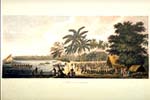|
|
James Cook |
|
|
|
|
|
|
|
James Cook |
|
|
|
|
|
In 1768, the navy asked Cook to lead a scientific expedition to Tahiti, a Pacific Island. He sailed from Plymouth in August, on the first of his three great voyages. Cook was determined to keep his crew healthy. He insisted his men eat onions and pickled cabbage every day, and made sure that the ship kept fresh fruit and vegetables on board. He ordered his men to bathe every day, to clean their clothing, and to air out their bedding. He did not know the scientific reasons behind these measures, but he knew they worked to prevent scurvy and other diseases in his crew.
His ship, the "Endeavour"
reached Tahiti in April, 1769. There, the scientists on the
expedition watched the planet Venus pass between the earth
and sun. This observation was the main goal of the voyage.
They stayed there for three months, getting on very well
with the native people of those islands.
Then they sailed for New Zealand. Cook carefully mapped the
coastline, and found the country to consist of two great islands
which he thought would be very good to settle in. The soil was
fertile, the trees were splendid, the natives vigorous and healthy,
though rather fierce.

In April 1770, the "Endeavour" sailed into Botany Bay on the east coast of Australia. Cook explored for two thousand miles, and claimed the entire coast for Great Britain. He returned to England sailing past New Guinea. At this point his crew caught malaria and dysentery, and everyone on the boat came down with it at some stage. A third of them died before the ship arrived back in England in July 1771.